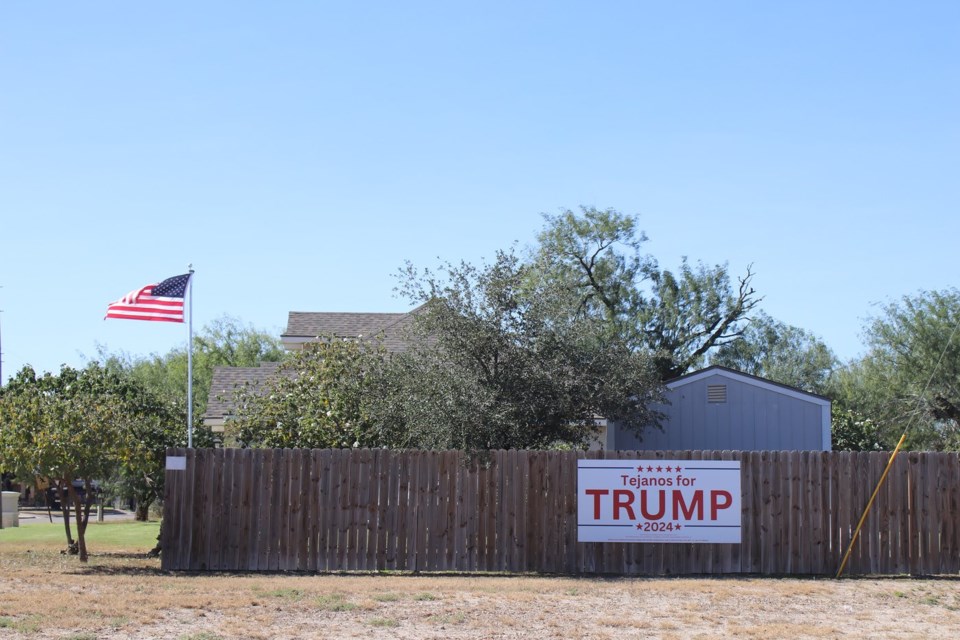GRANJENO — When Elizabeth Olivarez goes to the gym in the morning, she has her guard up. The yards and fields of her small Texas town are a well-trodden path for people who illegally crossed the border.
The 67-year-old has lived in her Granjeno home near the edge of the United States border with Mexico for 45 years, but a surge of migrants during the Biden administration left her on edge.
"It's horrible," Olivarez says. "Like you would see one (person)… and you call border patrol and they wind up bringing like two buses because there were so many people."
Nearby, a long stretch of Donald Trump's border wall, a large concrete barrier atop an earthen levee, serves as a daily reminder of the president-elect's promises on security and immigration.
Trump has long pledged to enact the largest mass deportation effort in American history and made securing the southern border central to his campaign.
Monday evening the president-elect posted on Truth Social that he will sign an executive order imposing a 25 per cent tariff on all products coming in to the U.S. from Canada and Mexico until both countries stop drugs, in particular fentanyl, and people from illegally crossing the borders.
"Both Mexico and Canada have the absolute right and power to easily solve this long simmering problem," Trump said. "We hereby demand that they use this power, and until such time that they do, it is time for them to pay a very big price!"
Immigration was a key and contentious issue and a majority of voters for both parties said improving border security was important.
The wave of migrants reached record levels under President Joe Biden. While numbers dropped off significantly, particularly since Biden tightened rules in June, the issue dogged Democrats.
Trump campaigned on an image of a Biden-led out-of-control border where migrants, who he cast as criminals and terrorists, were streaming into America, straining services and causing chaos.
When Vice-President Kamala Harris ascended to the top of the Democrats' ticket, the Republican painted her as the unsuccessful border czar. Her actual job in the Biden administration was to find long-term solutions to stem migration from countries in Central America.
But the die was cast. Harris couldn't flip Trump's script.
"It was really bad. Everybody was very disappointed because of Kamala and Joe Biden's open border policy," Olivarez says about the height of the crisis in her community of around 300 people.
The border issue helped Trump break the blue wall in South Texas. Hidalgo County, where Olivarez lives, was among the Democrat strongholds in Rio Grande Valley that flipped red.
Flags adorned with Trump's face wave throughout the largely Hispanic area.
Voters can have short-term memories, says Mark Kaswan, a political science professor at the University of Texas Rio Grande Valley. The first Trump administration's "zero tolerance" policies were deeply criticized in border communities. The Republican's family separation tactics were so controversial that Trump's daughter, Ivanka, pressured him to end it.
Kaswan also pointed to an infamous tent camp in Matamoros, a Mexico city a few feet from the Texas border. Advocates say migrants stayed in deplorable conditions because of Trump's policy informally known as "remain in Mexico."
"It was just horrific,” Kaswan said.
Stephen Miller, the architect of many of those policies, is set to return to the White House as Trump's deputy chief of staff for policy.
It's estimated there are more than 11 million undocumented immigrants living in the U.S. Trump has said deportations will begin Day 1.
It remains unclear how his plans will play out. Deportations under Trump's first administration never topped 350,000.
This time around, Trump suggested using the Alien Enemies Act of 1798 to target gang members for deportation and recently said he intends to declare a national emergency and use the military in his efforts.
The election was not based on facts or policy, Kaswan said. It was based on fear.
“The Republican Party is really good at fearmongering,” he said.
As the Republican leader makes crucial decisions about his administration, he has also sent signals that the northern border is in his sight. The number of migrants crossing from Canada is much smaller than at the U.S.-Mexico border, but recent increases have caught the attention of Republicans.
Tom Homan, Trump's incoming border czar, has called the Canada-U.S. border a national security issue and suggested it's a gateway for terrorists.
Marco Rubio, who has been chosen as Trump’s Secretary of State, recently blasted Canada's move to accept Palestinian refugees, claiming "terrorists and known criminals continue to stream across U.S. land borders, including from Canada."
There's also worry on the Canadian side about a swell of people heading north as a result of Trump's threats. After Trump's 2016 win, thousands of people in the U.S. who were afraid of rumours of mass deportations started travelling into Canada outside of regular border crossings.
In Zapata, a South Texas county east of the border, Hector Gonzalez says his community has not seen much migrant-related crime. But, he says, it's always on his mind.
"Under President Trump we had a very effective, secure border. The policies were there," Gonzalez says.
Gonzalez, and his sister, Mirtha, say they recognize that the U.S. is made up of immigrants, but people need to come legally.
Mirtha Gonzalez says her faith helps her support Trump's plans to deport millions of people, some who may even be her neighbours. The 71-year-old retired teacher points to the president-elect surviving an assassination attempt during the campaign.
"He insists that it's his mission to help people and I believe it," she says. "I believe there was a reason why this man was chosen."
This report by The Canadian Press was first published Nov. 26, 2024.
— With files from The Associated Press
Kelly Geraldine Malone, The Canadian Press




